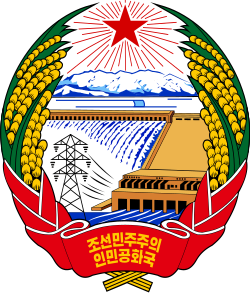| Eternal leaders of North Korea | |
 Bronze statues of former leaders Kim Il Sung (left) and Kim Jong Il (right) at the Mansu Hill Grand Monument | |
| Korean name | |
|---|---|
| Hangul | 주체조선의영원한수령 |
| Hanja | 主體朝鮮의永遠한首領 |
| Lit. | Eternal leaders of Juche Korea |
| RR | Juchejoseonui yeongwonhan suryeong |
| MR | Chuch'ejosŏnŭi yŏngwŏnhan suryŏng |
 |
|---|
The eternal leaders of North Korea or eternal leaders of Korea (officially the eternal leaders of Juche Korea) are honorary titles accorded to deceased leaders of North Korea. The phrase was used in a line of the preamble to the Constitution, as amended on 30 June 2016, and in subsequent revisions.
Contents
- History of the title
- Presidency of North Korea before 1994
- "Eternal President"
- "Eternal General Secretary" / "Eternal Chairman"
- Head of state role in North Korea after the deaths of Kim Il Sung and Kim Jong Il
- See also
- References
- Bibliography
It reads (in the original version):
Under the leadership of the Workers' Party of Korea, the Democratic People's Republic of Korea and the Korean people will uphold the Great Leader Comrade Kim Il Sung as the eternal President of the Democratic People's Republic of Korea and Comrade Kim Jong Il as the eternal Chairman of the National Defence Commission of the Democratic People's Republic of Korea [...]
— Constitution of North Korea [1]